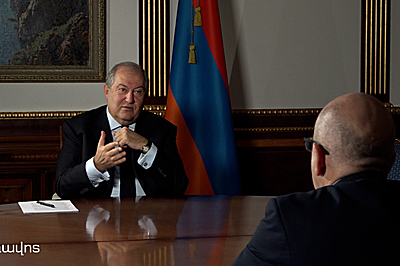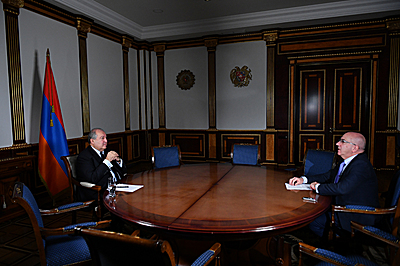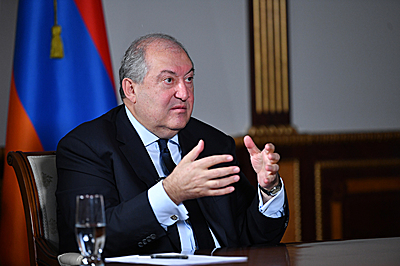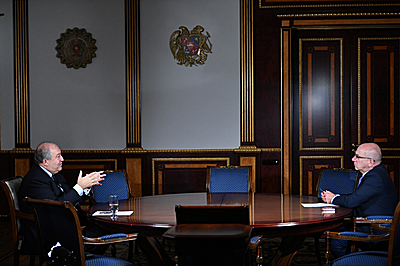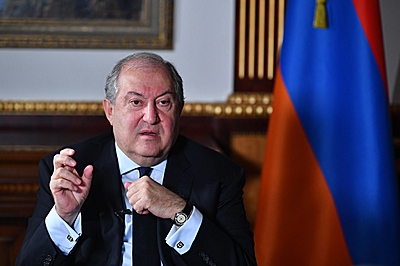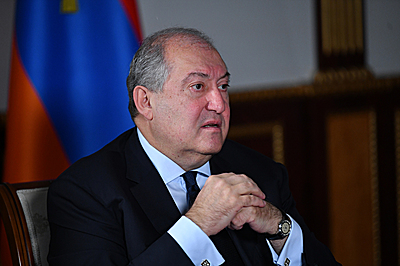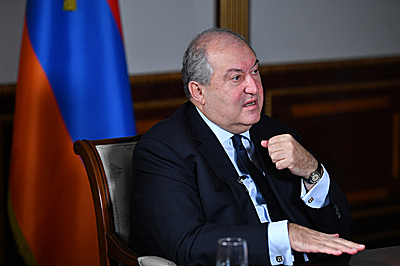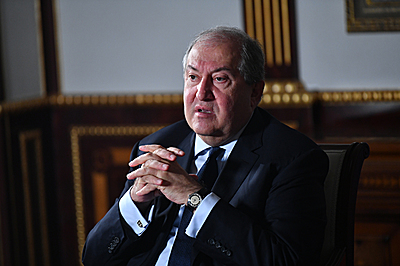Press releases
If the state and people manage to stand firmly on the ground, the whole world will respect us. The President of the Republic Armen Sarkissian’s exclusive interview to “Aravot” daily
Aram Abrahamyan: First of all, I would like to touch upon the statement signed by the Prime Minister of Armenia, and the Presidents of Russia and Azerbaijan, on November 10. How would you characterize it: a capitulation, defeat, or ceasefire. Are there points in that document that still need clarification?
- I do not think there is a need for me to describe that document. Though it is a short document, it is quite meaningful and may be interpreted in different ways. However, that document means a ceasefire to me. In this aspect, it is the most valuable document for me, as from that day on, I no longer hear about our boys, dying in the hostilities, and I do not sign decrees on awarding medals to the fallen heroes. I am happy for those families whose sons returned home. In other words, it has an immense value as a cessation in hostilities. We must do our best to ensure that the ceasefire is not violated.
It is essential that this statement was signed by the Prime Minister of the Republic of Armenia, the President of the Russian Federation and the President of Azerbaijan. Of course, the President of the Russian Federation not only signed it but also, in a sense, he is the guarantor of it. From the first day of the war, Vladimir Putin, as a friend and President of a fraternal state, did everything he could stop it. And we all know about his immense contribution. I would also like to remind you that although the hostilities are over, I think the adversary’s wishes and plans are not yet.
I think that this is a very bitter pill, but we must swallow it and try to rise from this fallen state and build our future. Yes, we lost the battle, but it is inadmissible for me to interpret the defeat in that battle as the defeat of our nation and our state. No, it is not. We have the opportunity and are able to rise and look forward to the future, to our victories and show the world that we are the people who are able to stand up after the greatest tragedy, as we did one hundred years ago.
Aram Abrahamyan: Mr. President, is it apppropriate to analize or to assess the reasons of that defeat, or is it too early yet to make any assessments and talk about the root causes?
- You know, of course, the time will come for us to analyze all this in a thorough and detailed way. Not only to talk about who is guilty, but also, in the first place, to prevent us from making similar mistakes in our history, in the history of our nation. I do not think it is the right moment to talk about the reasons and details, but since you have asked the question, I will try to answer a few points that are obvious today.
I think we have lost not just one war on the battlefield. I feel sorry that over the years we have not been able to create an army that could resist Azerbaijan, or NATO member Turkey, which, in principle, was possible as the military spirit, the commitment and hope of the people, their readiness to die for the cause of victory were present. What did we not have? Technologies, the right military equipment, we did not have the appropriate training and organization, but this was on the battlefield.
However, I think before the battlefield, we had also lost the demographic war. In 1994, when we won and were a victorious state, when the whole world, the same Europeans, and the same NATO thought that we had the most powerful army in the region. The population of Artsakh was a little over 100 thousand, and twenty-six years later it remained the same 100 thousand, or 130-150 thousand. We lost that demographic war. I think that in twenty-six years, it was possible that the population of Artsakh was, say, 500 or 600 thousand. I do not want to discuss in what way, but I am sure it was possible. However, that did not happen. When you are a soldier, it is one thing to have a population of one million behind you and it is something else to have a population of 100 thousand.
I think we lost the information war as well. I am not talking about Armenia, but about the international information sphere. I feel very sorry about that. We often say that we have a free press, high and modern. I have to say with regret that in fact today our news has turned into "copy-paste" information from Facebook. It is often baseless, just emotional, and illogical, reaching the most phenomenal limits of malicious and dishonest information. In recent years, I do not mean the last two years, instead of engaging in creating the so-called national information that would oppose Turkish or Azerbaijani propaganda abroad, we were busy cursing each other, we continue to this day, and this is a defeat, an informational defeat.
We also lost in international public diplomacy, because if in 1994, there was a so-called non-balanced pro-Armenian attitude in various international institutions, structures, and countries, I cannot say the same for today. Turkey and Azerbaijan have used efforts and finances for years to reach this aim.
We also lost in diplomacy, and lost very heavily. I think one of the reasons is that our Armenian diplomatic corps should have been three or four times larger, and better financed, with a staff of three or four times higher qualification, working more efficiently. And now, after swallowing this heavy and bitter pill, we must finally realize our national and state obligation, that our diplomacy, both public and professional, must be raised to a level that corresponds to the heaviest tasks we face. There are many examples. Countries, where we have not had diplomats for years, even those that are permanent members of the Security Council, or those, where we should have had a several times larger diplomatic corps, involving not only diplomats, but also the local community; we did not do that..
Thus, the reasons are clear. There are deeper reasons, perhaps more from the sphere of philosophy. If it interesting, let me say a few words.
Aram Abrahamyan: Yes, please...
If we take our state, there are definite principles that we must realize. First of all, I think we have been living for many years in a republic, indulged in wishful thinking, i.e. where the wish is mistaken for the reality, and we keep repeating this. We present the desired or what we want, which is a dream, as real. We say that we have an IT sphere in Armenia. We do not. In other words, we have a huge number of talented young people who aspire to it, but we do not have that system both in quantity and quality to acknowledge that we have. I have brought this example many times. Today, a country like Belarus has several times more, dozens of times more programmers than we do; it has a field of programming, which is invested with huge sums of money from abroad, from the USA and Canada, and that sphere is gigantic, as compared to ours. There is an information university with thirty thousand students. There are 150 thousand programmers, 50 thousand of whom are in a structure called the High Technology Park, which has an annual turnover of almost two billion dollars. The state did not invest anything there, but it had a policy. This is about Belarus, not China, France or the USA, nor the Silicon Valley. Consequently, we are left behind.
We say we have a glorious Academy of Sciences. Yes, we did have. But that Academy of Sciences has shrunk several times and it is badly financed, several times worse. Actually it is not clear whether an institute is needed or not, because it has become so miserable. We have brilliant scientists and individuals, but we do not have a system.
We are also a state, and when thinking about it, we personify many questions, and we personify everything. It means that we identify the ministry with the minister, the sphere with a person, we even personify our current problems we are facing with. We are not talking about system solutions, but about individuals and persons, regardless of who they are. People come and go, and in fact, whatever remains in history is what they left behind, and what they achieved. To seek salvation in individuals is a painful phenomenon. It means that you seek in individuals, as there is no system.
One of our first priority tasks should be the creation of a state system and the injection of state thinking into the people. This is very essential because state thinking has multicomponent occurrences, starting from state discipline. You cannot be a successful country, where even the lowest government officials feel at ease to express their own opinions in the Facebook, when there is hierarchy, when a state or a country is at war, when your freedom is also a powerful source of not only information, but also intelligence source for your adversaries. The attitude towards the state, being state-oriented and believing in the state, or the system is a big problem. I think in all our spheres, starting from the army, there must be system solutions, not individual solutions.
Aram Abrahamyan: Mr. President, are there any solutions now? Perhaps, there is a crisis. What solutions do you see? Perhaps we might recall that there was a crisis in 2018 as well, and you promoted for the solutions to be.
Thank you for the question. Today’s most important message remains the same. A message, advise or whatever you may call it, it does not matter. We are living in a time when we cannot permit in any way that our public order and the situation we live in go beyond certain limits. We must have not only intolerance, but also fail to listen to each other, when there are calls for hatred and vengeance, leading to hostile acts. This could bring forth an imbalance in the society as a whole, and a situation that might eventually lead to a breach in today’s ceasefire, which is impermissible. Think whatever you want to think about that document, whether it is bad or good, that’s it or not; this ceasefire situation is for us, it is for our people, because we are not ready for a new war, because the adversary or the enemy is just standing by us. Consequently, riots, clashes, and political polarization, which can lead to upheavals, loss of life or casualties, are inadmissible.
In this sense, my word, my request and my call to all law enforcement bodies is very essential. It is their duty to maintain order, but they must remember that the person standing in front of them, even the unruly person, is an Armenian. What happened in the National Assembly is absolutely unacceptable to me. And is that the way to solve our problems?
Or another incident: one of the members of the "Adequate" organization was stabbed. You can't go that way. Law and order must be in place, law enforcement agencies have their work to do there.
Now let me return to your main question. You said ‘crisis’. In order to try to find solutions, and to overcome a crisis, the first step must be the following. We have to admit that we have a crisis. If we do not accept that there is a crisis, then we will not find a way to solve the problems related to the crisis. Therefore, the crisis will not be resolved, but will deepen. The first step we must take is to acknowledge that we have a crisis.
Such acknowledging is not related to one or two phenomena. In 2018, which you talked about, it really seemed that there was neither economic crisis, nor a social one. It actually seemed that there was no Karabakh crisis, because there had been war in 2016, and we had lost young people and lands, but it did not seem to be a large-scale crisis. However, there was a crisis, because the people took to the streets, the people were not happy with a thousand things, corruption, the judiciary system, etc. I do not want to go back to that day.
The crisis or its main criterion, up to 100 or 200 thousand people in the streets, is one of the so- called occurrences of a crisis, but not the only one. That is to say you may not have 100 thousand people in the streets today, because our society is quite polarized and perhaps a huge mass of people who used to support a party or an idea, are disappointed or in such a heavy psychological state that have no wish to be in the streets, etc; there are a lot of reasons. We cannot measure whether we have a crisis or not, looking at the quantity of people in the streets. We have almost lost Karabakh today, we have lost thousands of young people and have thousands of injured. We have tens of thousands refugees from Karabakh, consequently, we have a humanitarian crisis, a disaster. These people need lodging, winter is coming soon, they have lost everything; they burnt their houses and came to Armenia. We have a profound economic crisis, which aggravated due to coronavirus, etc. To fail to notice that this a crisis is not acceptable to me in any case.
I do not believe that there is any person or party, even parties that can alone extricate the country from this difficult situation, and take that responsibility. Whoever takes responsibility will become the target of everyone else, because the problems are so deep that I do not exclude that there will be demonstrations in front of the government building almost every day: either the families of those who fell in war, or people living in difficult social conditions, then the young people who returned from the army and do not have any job. This is a deep crisis that needs to be handled by adhering to a few principles. Firstly, we must overcome the crisis all together. Secondly, we must do our best to ensure that the stability of the country is not undermined in any case. Along with the destabilization, the ceasefire will end, we shall be involved in a new war we are not ready for, but our adversary is. In that case, it will be very difficult even for our best friends to help and protect us.
Aram Abrahamyan: Mr. President, why did you mention in your message that you think early elections are the solution of the issue?
-I shall try to explain if it is not clear. I mentioned two facts: early elections and a government that has received, or that has the people's support. Let me try to explain both.
After all, we are a parliamentary state. In any parliamentary democracy, when there are crises (and that crisis can be national, - suppose in a country like Spain, when Catalonia decides to go to autonomy, or take the Scots, - it can be economic and political, which is the result of hostilities), any government always goes back to the people and asks for a renewed mandate.
Our last parliamentary elections took place one, or one and a half years ago. Armenia of that time and Armenia today are very different. If you are in power, it is logical to go back and take another mandate from the people without fear. In that case, your critics will have nothing to say. Do not forget that this ceasefire is only for five years. We all must raise our country and our army within this period. No one can say what will happen after five years.
I did not say that we should make that choice tomorrow. Of course, not. If we have elections today, they will be elections of feelings and emotions of humiliated and angry people, which will fail to express the reality. Naturally, these elections can take place in half a year or a year, if, of course, we overcome the coronavirus, and I think we will overcome it in a year. But it is right to announce about them, so that people know that we will eventually listen to their voice.
How should this be governed before the new elections? Very simply. There is not a single force that can handle this crisis alone. It is essential to us that the government that works is not busy every day responding to its opponents, organizing counter-protests, responding to fake news or fakes, but is busy rebuilding the country and overcoming the crisis from morning to night. Therefore, as I said, the only solution is to have a government of national accord.
What does this mean? This does not mean that everyone should be there. This means that first of all the main political forces must participate in it, starting from the government to the opposition, representatives of the society, those who are the so-called silent majority, those who are our most politicized people today, representatives of the regions, and businessmen.
I shall say once again, I am not talking about the Committee for the Salvation of Armenia, and I am not talking about the Constitutional Assembly. No, I am not. We are a state, we have a Constitution, we like it or not. And in this country, there is an institution called the Presidential Institute, which was set up just for such moments to be the platform where people come together to find the common ground that connects them all. After that, will this government be a government comprised of other parties besides the ruling party represented in the Parliament? Please. If there is a decision that there should be no party, but professionals, and a technocratic government, please. However, this agreement should be reached not in the streets, but around the table. I do not want us to take to the streets and curse today and throw stones at each other tomorrow, instead of gathering around the table and solving our problems as civilized people and reach the mechanisms to help us cope with the crisis. And God forbid that the next day the soldier given the weapon to defend his homeland might direct it against homeland. It is inadmissible.
Thus, my suggestion is very simple. I am the person who officially has the duty to invite everyone to the table. The statement I made, is naturally addressed to everyone - the government, the authorities, the opposition, public structures and organizations. That statement cannot be endless in terms of time. However, it corresponds to the current situation. If I receive a response from both the government and the opposition that they are ready for such a dialogue, I shall present the so-called time map to them, which, first of all, must include the so-called general group of national-state values and ideas, the assessment of today's and tomorrow's economic and political developments and situations, and only after that the road map, i.e. how we should handle the crisis.
That would be my opinion as an investment. This does not mean that it will be final. I will place it for general consideration. And that road map should clearly state how we will solve this problem: Who? By what means? In what period of time? Who will be responsible for it? There are two choices: either we accept that there is a crisis, or we accept that there is not. If we accept that there is no crisis, then the government has to propose its approaches, and there will be changes in the government; as a result, the government must continue its activities. And if my offer is not accepted, I will have to continue my daily work, but this time much harder.
These days, I have talked to many Armenian structures, organizations and individuals in the Diaspora. People are under a heavy burden. It is very essential at this moment that we win from defeat. This is very important, because we will be judged not only by our generations, children, and grandchildren, but also by the international community, which is watching us closely. I assure you that the whole world will respect us if this state and people manage to rise, giving a helping hand to each other. Not only the world, but we will also respect ourselves, we will get over the loser complex, because we will be sure that we will win tomorrow. That is why it is very important that we overcome our difficulties today, our tragedies, our dividedness, and finally, as a united people, start building the country we want, which is not only strong, but also powerful ... To be powerful, you do not have to be big, one should be what we are talking about, organized and committed, powerful in structures, not in individuals. And, of course, my responsibility is the same as it was in 2018. Yes, in 2018, I felt my duty of the President that I should go to the square with the aim of avoiding bloodshed and conflict, but to bring the parties to a conversation, a dialogue. And we know the result, what happened. From today's viewpoint, I can thank the leaders of the movement and the revolution, Nikol Pashinyan, the government of that time, in particular, the former President of the Republic, Serzh Sargsyan, who found the strength to make a decision to leave the position of the Prime Minister, and not to make the country unstable first and foremost.
I want to remind you that today's Prime Minister was the Prime Minister of a country where he did not have an absolute majority, on the contrary, his opponents had an absolute majority. The real political force of the movement is in the Parliament. They should do their best to make a positive contribution, as well as the other members of the Parliament.
It is my duty to ensure this transition, and to do everything in my power to ensure that we succeed, especially in the spheres of economy and investments. It is not accidental that during these difficult days, I went to the United Arab Emirates for a very short time. First of all, to our Arab friends, moreover, the friends who after the Genocide gave homes to all of us, to our Diaspora,, to confirm once and for all that this war was not, is not and will never be religious, that the Muslim Arab states are our friends. And not only are they our friends, but also that we expect their support. I received clear assurances from them, the leaders of several major countries. If we are the country that continues the conversation I have with them, and that country is stable, they are ready to make investments here.
In other words, there is a way-out of this situation, to really build our strong Armenia. But we must all work together to build a state based on systems, not individuals.
Aram Abrahamyan: I have known you for a long time, I know that even in your own difficult circumstances you have maintained your optimism. Are you now optimistic as well?
- I am certainly optimistic. People say that the President supports this or that side, it is usual to me. When I became President, in the first months they said that I was the President of the Republicans, then I became the President of the “My Step” party members. I am not the President of anyone, I am trying to be the President of the people. I have learned the lessons of my life long ago. I was Prime Minister 25 years ago. Unfortunately, it was God's will that I did not continue, although I knew exactly what I was doing, how I was going to move forward, I had the full support of the President of the Republic of those days and the Speaker of the National Assembly. But it was God's will. I have passed a long way, recovering from a serious illness for one and a half years, going through all my hardships, both personal and the difficult days of the 1990s, when no one believed that the people would rise.
I am really optimistic. Everything depends on us. The way to rise from the ground is to hold hands, because you will not be able to stand up alone. If we hold hands, we will be able to rise from the ground and build the country we all dream of. And let us not repeat all those mistakes we have made.
We do not have oil, but we have an immense potential - human potential. We say toasts to it, but we do not use it at all.
Our first task is human and to use our human resources, those of our compatriots and everyone. We think we are in trouble, we need ministers, new ideas, and professional management. I can list not one, but ten governments based on all the people I know who hold senior positions in different countries and have vast experience. Lord Darzi, one of Britain's most famous health organizers and doctors, and dozens of such people. Can any of them come to Armenia today to become a member of the National Assembly or a minister? No, they cannot, because we have built a barrier with our own hands. A person should come here, live for four years, renounce citizenship, be only Armenian living in Armenia, and after that he will think whether he finds it convenient to be a minister or not. How can it be so, when we need everyone's support every day? There is no longer Diaspora, Diaspora Armenian, or Armenian from Artsakh in my consciousness. Our homeland is so small that each of us must not only recognize our homeland, but also must consider that each village is his/her own. And let it be the same for every Armenian in the Diaspora: every corner of this small country belongs to him, and he belongs to it. And when it is necessary, not only during the war, to stand up, overcome the crisis, develop the country, build a strong army and economy, every one of them, if he wishes, must be given that opportunity tomorrow.
Aram Abrahamyan: Thank you, Mr. President.
- Thank you, Mr. Abrahamyan.
